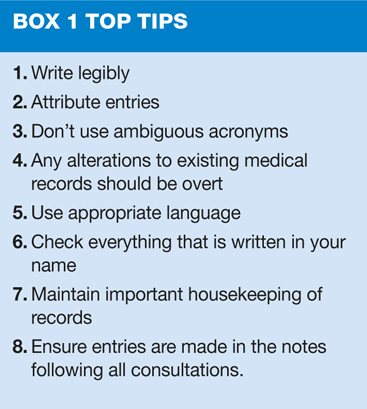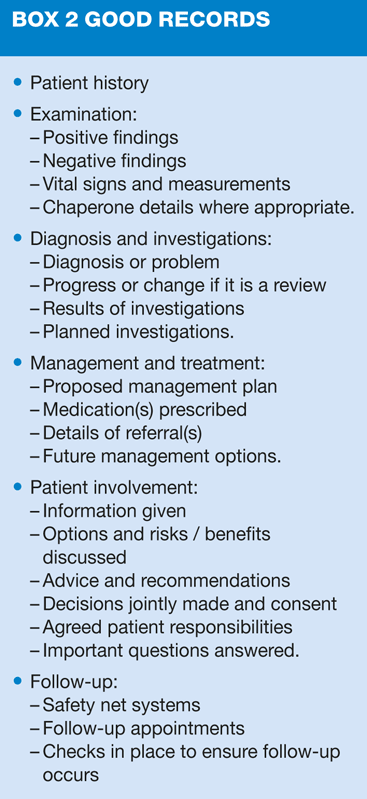Medicolegal issues: The importance of good medical records
Kate Taylor
Kate Taylor
Clinical Risk Manager, Medical Protection Society (MPS)
As nurses, we fear that one mistake could result in patient harm and potentially lead to a complaint or claim. Former nurse Kate Taylor, Clinical Risk Manager at the Medical Protection Society looks at why good medical records are essential to protect nurses, practices and their patients
We live in an increasingly litigious society, where nursing professionals provide care for well informed and engaged patients. As advertisements encouraging patients to pursue claims of clinical negligence become more common, how can we protect ourselves and our profession? Maintaining complete, contemporaneous records is essential to provide evidence of care and treatment given, which can prove valuable in defending a complaint or claim. Good records can amount to a good defence, whereas poor records will provide a poor defence.
Many nurses are aware that their clinical entries aren't always as comprehensive as they should be, a point brought sharply into focus when they are asked to explain their assessment and management of a patient a long time after a consultation took place. We cannot always rely on our memory to recall a particular consultation or episode of care.
In the event of a complaint or claim, medical and nursing records are likely to be examined closely by experts, administrators, lawyers, the courts and the Ombudsman - as well as by patients who have a right to access their own medical records under the Data Protection Act 1998. Think about what impression your records might give about your care of patients.
Fraser1 identifies that the quality of a practitioner's record keeping can be seen as a direct reflection of their approach to and standard of professional practice. Therefore where a nurse always maintains neat, accurate and contemporaneous records it is very likely that they will adopt the same meticulous approach to their nursing practice. Similarly, Prideaux2 says that gaps in medical records can be interpreted as invisible care and may be seen by a court of law as evidence of negligence.
Nurses have a professional obligation to maintain complete, contemporaneous records. It is an integral part of nursing practice and is essential to the provision of safe and effective care; it is not an optional extra to be fitted in if circumstances allow.3 Keeping good clinical records is also essential for continuity of care, especially when many clinicians are involved in delivering care.
Poor record keeping is one of the most common reasons for a healthcare professional to be removed from the Nursing and Midwifery Council (NMC) Register. From May 2010 to May 2011, the NMC's Fitness to Practise panel issued striking off orders to 28 nurses whose poor practice included deficient record keeping.
WHAT IS A MEDICAL RECORD?
The Data Protection Act 1998 defines a health record as 'consisting of information about the physical or mental health or condition of an identifiable individual made by or on behalf of a health professional'.
Medical records should contain all the pertinent information about a patient's care and can cover a wide range of material including:
- Handwritten and computer generated clinical notes
- Letters to and from other health professionals
- Laboratory reports
- X-rays
- Printouts from monitoring equipment, e.g. ECG recordings
- Incident reports and statements
- Photographs
- Videos
- Recordings of telephone call
- Communication with patients and other healthcare professionals regarding the patient's care, e.g. text messages, emails, messages.
WHAT MAKES A GOOD RECORD?
A good record will contain enough information to enable another clinician to easily take over the patient's care and understand the possible diagnosis, investigations, and treatment recommended or provided. It is also important to bear in mind that the patient can request access to records at any time and would expect to see all relevant details about their care. (Box 2)
WHY DON'T WE ALWAYS KEEP GOOD RECORDS?
We are all aware that we should keep good records, so what are the factors that prevent us from doing so?
'Time pressures are against us'. It is always a difficult balance between how much to write in the notes and how much time you have available. What you include or leave out of the medical record is a matter of professional judgement, but you should include all information that other members of the team would need to continue care of the patient safely.
'We're just too busy'. Increasing patient lists and shortened appointment times mean that time is already stretched.
'It's such a chore'. It can be seen as a burdensome task which impinges on our nursing practice, but it is just as important as providing the care to allow others to continue care safely.
'I am not good with computers'. Records are mainly held in electronic format which some nurses find laborious as typing skills were not a pre-requisite for becoming a nurse. Training can often be provided by your employer if requested.
'I have never incurred a claim'. This may be so but experience tells us that around 40% of medical associate claims incurred in the UK and Ireland involve nurse practitioners or practice nurses.
'I know my patients'. Having known their patients for several years some nurses feel they can rely on their memory. You may be able to remember key information but if you are involved in a claim or complaint, without evidence, those examining medical records will not look on it favourably.
SUMMARY
All healthcare professionals have an obligation to keep accurate and contemporaneous records, which are a vital component of providing good quality clinical care. The entries you make should enable another nurse or doctor to seamlessly take over the care of the patient. As well as the primary need to ensure patient safety, good medical records can serve to protect you against future complaints and claims.
REFERENCES
1. Fraser, J Keeping midwives out of court. Practising midwife. 2010;13 (30):36-37
2. Prideaux, Issues in nursing documentation and record-keeping practice. British Journal of Nursing. 2011; 20(22): 1450-1454.
3. Nursing and Midwifery Council. 2010 Record keeping; guidance for nurses and midwives.
4. MPS workshop case study, Medical Records for Nurses in Primary Care.
Related articles
View all Articles



